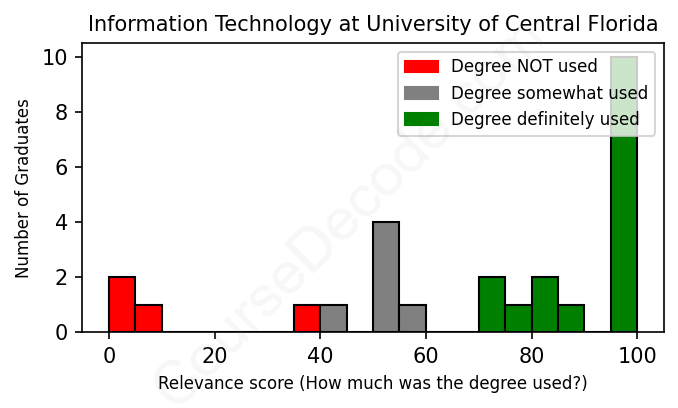
First, some facts. Of the Information Technology graduates from University of Central Florida we've analyzed , here's how many have used (or NOT used) their degree in their career:

These are estimates based on AI analysis of 26 LinkedIn profiles (see below).
The verdict? Slightly above average. Overall, with an average relevance score of 69%, Information Technology graduates from University of Central Florida have a slightly higher likelihood (+2%) of finding work in this field compared to the average graduate across all fields:
And for comparison, here's the chart for all profiles we've looked at across all degrees.
Also, after graduating, only 11% of these graduates have pursued further education other than another Bachelor's degree (such as a Masters degree or other), compared to the average across all profiles of 35%. This suggests a Bachelors degree is enough for most Information Technology graduates, and it's normal to look for work straight after graduation.
See the details:
|
Relevance score: 0% We think this person has NOT gone into a career related to their degree. We think this person has NOT gone into a career related to their degree.
DEGREE INFOGraduated in 2022 from University of Central Florida with a Bachelor of Technology - BTech in Information Technology. No other secondary education since. JOB HISTORY SINCE GRADUATIONGSME Technical Support Specialist Omni Interactions Mar 2022 - Aug 2023 Technical Support Specialist  Omni Interactions Mar 2022 - Aug 2023 GSA  Omni Interactions Dec 2022 - Aug 2023 ABOUTExperienced Merchandiser with a demonstrated history of working in the logistics and supply chain industry. Skilled in Python, Microsoft Excel, Jupyter, Linux, and Microsoft Access. Strong marketing professional with a Associate of Arts - AA focused in Computer/Information Technology Administration and Management from Valencia College. |
The top 10 most common jobs done by the graduates we've analyzed (ranked most common to least) are:
When looking at the careers of graduates from the University of Central Florida with a degree in Information Technology, you'll see a pretty diverse range of job titles, but some common themes emerge. Many graduates land roles like IT Systems Administrator, Software Engineer, and Network Engineer, which really tap into the skills they learned during their degrees. It’s also apparent that several graduates have ventured into areas such as help desk support, technical support, and customer service roles; however, those often lack the depth of IT-specific skills that were part of their education.
Overall, while many of the jobs are definitely related to Information Technology, there are notable exceptions. Positions like Helpdesk Support Specialist or roles focused on customer service don't fully utilize IT knowledge, but they still provide a starting point for many up-and-coming professionals. On the brighter side, roles such as Software Developers or System Engineers show a strong connection to the degree and the necessary technical competencies, indicating that there are plenty of relevant and rewarding opportunities available for those who hold this degree. It's a mixed bag, but if you're aiming for something closely tied to IT, there are definitely pathways to get there!
Here is a visual representation of the most common words in job titles for Information Technology graduates (this is across all Information Technology graduates we've analyzed, not just those who went to University of Central Florida):

Looking at the career trajectories of graduates from the University of Central Florida with degrees in Information Technology, it's clear that many have found solid footing in the tech industry. Generally, the first jobs after graduation tend to be entry-level positions like IT Technician, Helpdesk Support Specialist, or Software Developer intern roles. For example, graduates from 2017 held roles in technical support and cloud application engineering right after school, which is a common starting point for many IT graduates. As they gain experience, many of these individuals move up to roles with more responsibility, such as Systems Administrator or Software Engineer, often within a few years.
Five to ten years after graduation, it's common to see these alumni in advanced positions like IT Security Analysts, System Engineers, or even managerial roles in data science and project operations. A notable trend is how some graduates have successfully transitioned into specialized fields within IT, such as cloud computing, cybersecurity, or systems architecture. Meanwhile, there are others who have taken less direct paths, like those working in customer support or non-technical roles. Overall, while some might not have landed their dream jobs directly related to their IT degrees, a significant number are doing well within the tech sphere and carving out successful careers relevant to their education.
Getting a Bachelor’s degree in Information Technology at the University of Central Florida can be a bit challenging, but it’s definitely manageable if you’re dedicated and willing to put in the effort. The coursework covers a range of topics like programming, networking, and databases, which can be intense but also pretty interesting if you enjoy tech stuff. Compared to some other majors, IT tends to be a little more hands-on and practical, which some students find easier because they can see how what they’re learning applies in real life. Overall, it's not the toughest major out there, but it does require consistent effort and a good amount of time spent on assignments and projects, so be prepared to work a bit!
Most commonly, in the LinkedIn profiles we've looked at, it takes people 4 years to finish a Bachelor degree in Information Technology.
So, looking at the job histories of these UCF grads, it seems like they’ve had a pretty decent ride when it comes to making money, especially considering the tech industry's general pay scale. Many of them started with solid entry-level roles after graduation and, over the years, moved into more specialized positions like system engineers and software developers, which typically come with better pay. A couple of them landed gigs at big names like SpaceX and Lockheed Martin, which is a huge sign of good financial potential. However, you also see some who took a more unconventional route or have jobs that might not be raking in the big bucks just yet, like those in support roles or starting positions. Overall, it looks like a lot of them are on a solid path to financial stability and growth!
Here is a visual representation of the most common words seen in the "about" section of LinkedIn profiles who have a Bachelor degree in Information Technology (this is across all Information Technology graduates we've analyzed, not just those who went to University of Central Florida). This may or may not be useful:

Here are all colleges offering a Bachelor degree in Information Technology (ordered by the average relevance score of their Information Technology graduates, best to worst) where we have analyzed at least 10 of their graduates: